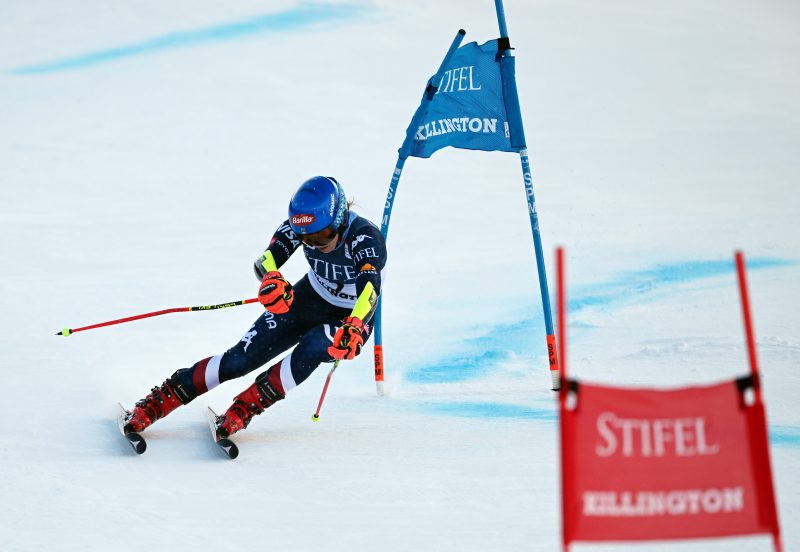As expected, Mikaela Shiffrin will miss the second U.S. stop on the World Cup circuit.
Shiffrin said Wednesday that she’s ‘starting to feel a little bit more human’ after suffering a puncture wound in her abdomen in a crash in a giant slalom race in Killington, Vermont. But whatever caused the puncture wound also dug ‘a cavern’ in her oblique muscles, making it impossible for her to race at Beaver Creek, Colorado, next weekend.
There’s a downhill race Dec. 14 and a super-G the following day at Birds of Prey.
‘This is another fairly ambiguous injury and really hard to put a timeline of when I’ll be either back on snow or back to racing. But I do know that I will not be starting in Beaver Creek,’ Shiffrin said in a video posted to her social media accounts.
‘This is a really big bummer, not to be able to race Birds of Prey,’ the Colorado native said. ‘But on the other hand, I was really lucky and I’m really looking forward to cheering my teammates on racing Beaver Creek.’
Shiffrin was lucky to escape more serious injuries in the crash at Killington, her first chance at getting her 100th World Cup victory.
She had a comfortable lead after the first run of the giant slalom Saturday, but less than 15 seconds from the finish line in the second run, Shiffrin lost an edge. She slammed into one gate and somersaulted into another before coming to a stop in the safety netting. She spent about 20 minutes on the hill before being taken down on a sled.
Though the puncture wound and abdominal trauma appeared to be the worst of her injuries, Shiffrin said she did go to a hospital after she returned to Colorado on Tuesday to make sure her colon wasn’t damaged.
‘There were some air bubbles where the puncture came pretty close to the colon. Last night’s check confirmed that my colon is, indeed, intact. We would have seen symptoms sooner but it’s just good to have that confirmation,’ Shiffrin said.
‘As far as the muscle trauma goes, there’s a puncture and then basically whatever stabbed in there did a little dancey dance inside of my obliques and basically tore a cavern into my oblique muscles. That’s what’s causing bleeding and inflammation and just pain, in general.’
World Cup races this weekend in Canada were canceled because of snow conditions. After Beaver Creek, the circuit returns to Europe, with a pair of super-G races in St. Moritz, Switzerland, on Dec. 21-22. There are slalom and giant slaloms the two weeks after that, first in Semmering, Austria, on Dec. 28-29, and then Kranjska Gora, Slovenia, on Jan. 4-5.
Whenever Shiffrin does return, her next victory will be the 100th of her career, a jaw-dropping milestone. Ingemar Stenmark’s record of 86 World Cup wins was once considered untouchable, standing for 30-plus years despite the best efforts of Lindsey Vonn, Marcel Hirscher, Hermann Maier and Alberto Tomba. But Shiffrin not only broke Stenmark’s mark, getting her 87th win in March 2023, she has blown past it.
She has not said how much longer she’ll ski but, at 29, she’s still in the prime of her career. If she keeps winning at this rate — at least five races a season for the last 11 years, with the exception of the injury- and COVID-shortened 2020-21 season — Shiffrin will join Michael Phelps, LeBron James and Simone Biles on that rare list of athletes whose records truly are unbeatable.
Hirscher, who ended a five-year retirement this season, is the closest active skier to Shiffrin and he has 67 wins. Vonn, who has 82 wins, is trying to make a comeback but has yet to race.







